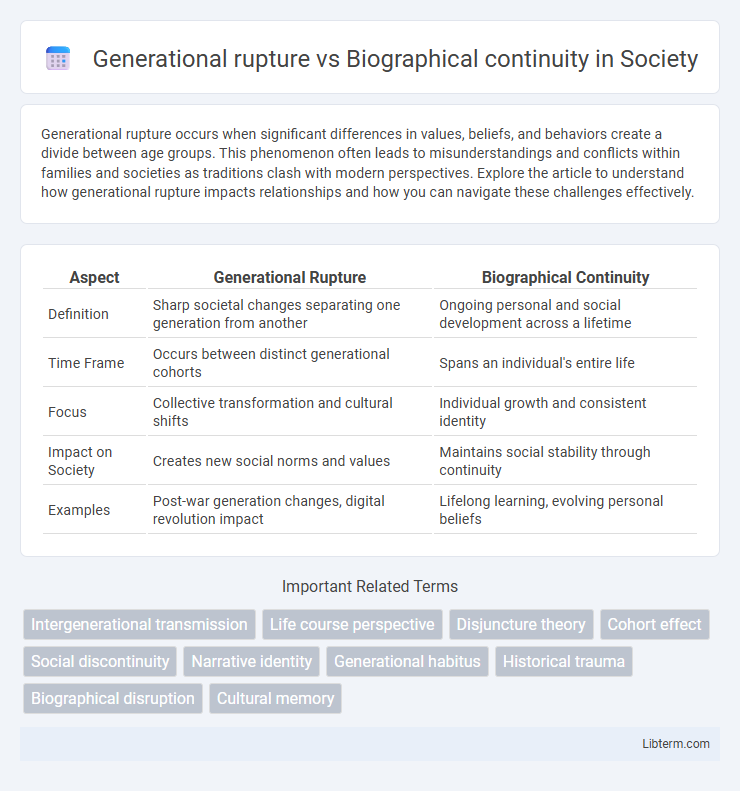Generational rupture occurs when significant differences in values, beliefs, and behaviors create a divide between age groups. This phenomenon often leads to misunderstandings and conflicts within families and societies as traditions clash with modern perspectives. Explore the article to understand how generational rupture impacts relationships and how you can navigate these challenges effectively.
Table of Comparison
| Aspect | Generational Rupture | Biographical Continuity |
|---|---|---|
| Definition | Sharp societal changes separating one generation from another | Ongoing personal and social development across a lifetime |
| Time Frame | Occurs between distinct generational cohorts | Spans an individual's entire life |
| Focus | Collective transformation and cultural shifts | Individual growth and consistent identity |
| Impact on Society | Creates new social norms and values | Maintains social stability through continuity |
| Examples | Post-war generation changes, digital revolution impact | Lifelong learning, evolving personal beliefs |
Understanding Generational Rupture
Generational rupture describes significant breaks in cultural, social, or political values that distinguish one generation sharply from another, leading to shifts in collective identity and historical experience. It contrasts with biographical continuity, where individual lives maintain consistent narratives despite changing societal contexts. Understanding generational rupture requires analyzing historical events, social transformations, and intergenerational tensions that disrupt established patterns of memory and identity formation.
Defining Biographical Continuity
Biographical continuity refers to the consistent and coherent narrative individuals maintain throughout their lives, linking past experiences with current identity and future aspirations. This concept highlights the stability of personal development despite external changes, contrasting sharply with generational rupture, which emphasizes conflict and disjunction between age cohorts. Understanding biographical continuity is essential for analyzing how personal histories shape resilience and adaptation within rapidly evolving social contexts.
Historical Contexts Shaping Generational Change
Historical contexts play a crucial role in shaping generational rupture by creating distinct experiences that separate one generation from the next, such as wars, economic crises, or technological revolutions. Biographical continuity, however, emphasizes the persistence of individual life trajectories and personal identities despite these macro-level disruptions. The interplay between collective historical events and personal narratives determines how generations either break sharply from or maintain links with the past.
Theories Linking Individual Lives and Collective Shifts
Generational rupture emphasizes abrupt breaks between social generations, marked by distinct historical events that reshape values and identities, while biographical continuity highlights the persistence of individual life courses within broader social structures. Theories linking individual lives and collective shifts explore how historical moments influence personal trajectories, integrating concepts like Mannheim's generation theory and life course sociology. These frameworks analyze how collective experiences shape generational consciousness and how biographical patterns reflect or resist societal transformations.
Major Events Triggering Generational Divides
Major events triggering generational divides often include wars, economic crises, and technological revolutions, which create distinct collective experiences shaping generational identity. Generational rupture occurs when these events cause a sharp break in values and behaviors between cohorts, while biographical continuity allows individuals within a generation to maintain consistent life narratives despite external changes. Examples include the Great Depression's impact on the Silent Generation versus Millennials adapting to digital transformation without losing connection to broader historical contexts.
Family Narratives and the Transmission of Values
Family narratives play a crucial role in mediating generational rupture and biographical continuity by serving as vessels for the transmission of core values across generations. These narratives reinforce collective identity, enabling younger family members to navigate societal changes while maintaining a sense of belonging and ethical grounding. Through storytelling, memories, and shared experiences, families bridge the gap between past and present, ensuring the persistence of cultural and moral frameworks despite temporal disruptions.
Intergenerational Memory: Persistence and Breaks
Intergenerational memory exhibits both persistence and breaks through the dynamics of generational rupture and biographical continuity, shaping collective identity over time. Generational rupture highlights moments when inherited memories or narratives are disrupted, often due to socio-political upheavals or cultural shifts, creating gaps in memory transmission. In contrast, biographical continuity emphasizes the stable transmission of personal and collective experiences across generations, ensuring the endurance of cultural values and historical knowledge.
Case Studies: Rupture versus Continuity
Case studies on generational rupture versus biographical continuity reveal diverse outcomes in personal identity formation across historical events. In contexts of socio-political upheaval, such as post-war reconstruction or revolutionary regimes, individuals often experience a rupture marked by shifts in values, behaviors, and collective memory. Conversely, some biographies demonstrate continuity where cultural traditions and family narratives persist, bridging generational divides despite external disruptions.
Implications for Identity and Social Belonging
Generational rupture, marked by stark shifts in values and cultural norms, disrupts traditional identity formation, challenging individuals to reconcile inherited beliefs with evolving societal expectations. Biographical continuity, emphasizing consistent personal narratives, fosters stable social belonging by linking individual experiences to collective histories. The tension between these dynamics influences how people construct their sense of self and position within communities, impacting social cohesion and intergenerational dialogue.
Navigating Generational Differences in the Modern World
Navigating generational differences in the modern world involves understanding the complex interplay between generational rupture and biographical continuity. Generational rupture highlights the distinct social, technological, and cultural shifts that separate one generation from another, often leading to conflicting values and communication styles. Biographical continuity, however, emphasizes the persistent individual life experiences that bridge these generational gaps, enabling mutual empathy and adaptive dialogue across age groups.
Generational rupture Infographic

 libterm.com
libterm.com